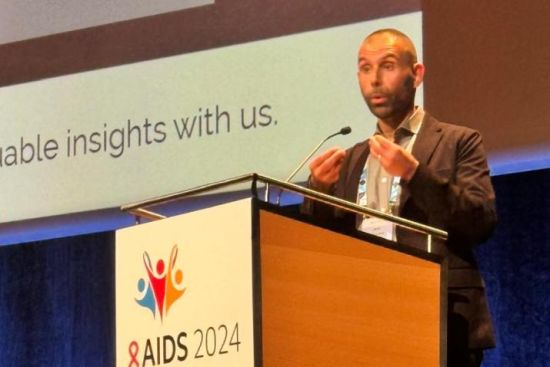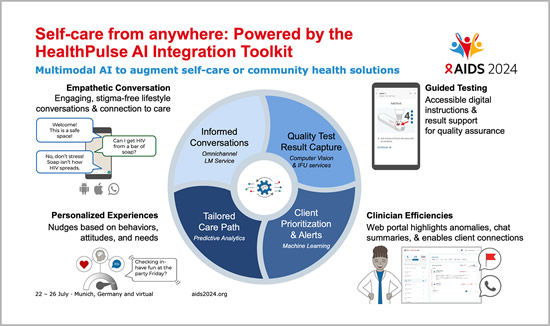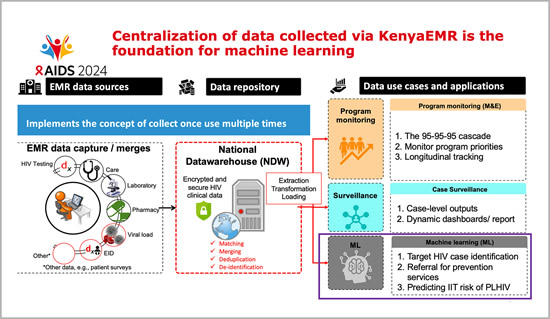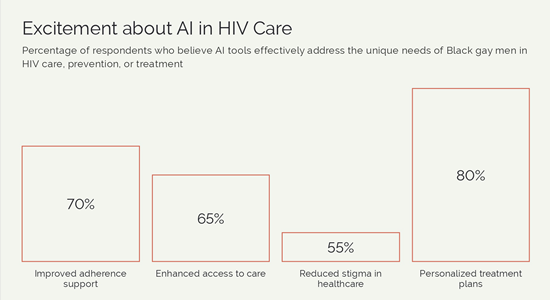Can AI Spark New Progress Against HIV?
Discussions at the AIDS2024 conference set the stage for a future where technology and human compassion work hand-in-hand to end the AIDS epidemic.

Jirair Ratevosian presents at the AIDS2024 conference in Munich, Germany.
By Jirair Ratevosian
Published August 2, 2024 under Commentary.
Jirair Ratevosian, DGHI’s inaugural Hock Fellow, shares this report from the AIDS2024 conference which took place July 21-26 in Munich, Germany.
The International AIDS Conference has long been a hub for cutting-edge discussions on global health, and this year AIDS2024 was no exception. While the big news at the conference was the promise of new medical breakthroughs in HIV prevention, several sessions and side meetings focused on the transformative power that artificial intelligence (AI) is already having in healthcare delivery.
The hope surrounding AI technologies could not come at a more critical time in the global fight against HIV. Despite significant progress, the virus continues to be a major public health issue, affecting 39.9 million people worldwide in 2023. New infections are continuing to increase in three regions — Eastern Europe and Central Asia, the Middle East and North Africa, and Latin America — according to a new UNAIDS report. At the same time, the decline in international funding and political commitment is raising alarm bells and threatening the sustainability of the long-term response. The human and economic costs of not meeting global goals could be substantial, underscoring the urgency for renewed efforts and innovative solutions.
“This powerful technology can break down silos, eliminate inequities and increase access to care for more people.“
Amid these challenges, AI emerges as a powerful disrupter that can address some of the most pressing issues in HIV care and delivery. AI technologies offer potential solutions to enhance diagnostic accuracy, optimize treatment protocols and catalyze public health engagement. We’re told AI can also make programs and budgets more efficient. But it’s essential that we guide the development of these tools to meet the moment. That includes fostering responsible AI that puts consumers at the center, prioritizing privacy, data security and accessibility.
Here’s a look at the AI highlights from AIDS2024:
Enhancing Healthcare Quality through AI
Rouella Mendonca and colleagues from Audere revealed the HealthPulse AI toolkit which exemplifies how multimodal AI can provide personalized, empathetic support through platforms like WhatsApp. This technology empowers clients to choose self-care paths, from chatting and asking questions to self-testing and post-test counseling. Emphasizing equity and safety, the AI aims to address challenges such as resource mobilization and stockouts, enhancing personalized care across the continuum.

Generative AI in HIV Care
Benedette Otieno and her colleagues from Palladium highlighted the transformative potential of generative AI in HIV care. The KenyaHMIS showcased an application that uses machine learning to accurately identify high-risk clients, ensuring optimized HIV testing. Additionally, it identifies risk profiles for patients, enabling providers to offer tailored prevention interventions. Outside the clinic, AI-assisted geospatial mapping pinpointed high-risk regions, allowing for targeted public health interventions.

Community Perspectives on AI
On behalf of Global Black Gay Men Connect (GBGMC), I presented interim findings from an ongoing study focused on the knowledge, attitudes and practices towards AI among Black gay men in Africa. Our analysis revealed a strong belief in AI's potential to enhance HIV prevention and treatment. About 75 percent of respondents agreed that AI could significantly improve the effectiveness of these programs. We also highlighted some of the respondents’ biggest concerns, particularly around data privacy, the accuracy of AI recommendations and the accessibility of necessary technology. The findings show we must prioritize the voices and needs of the communities these technologies aim to serve, ensuring that the design and implementation of AI are inclusive, equitable and ultimately acceptable.
Fighting Inequities with AI
While addressing barriers requires legal reforms and societal changes, AI, with its empathetic systems like chatbots and virtual assistants, can play a crucial role by providing confidential, non-judgmental support, encouraging greater engagement with healthcare services.
Zhao Ni from Yale presented the development of AI chatbot, which was shown in Malaysia to be helpful in avoiding stigma-inducing interactions and increasing the frequency of HIV testing and PrEP uptake among men who have sex with men (MSM) . Because stigma, discrimination and restrictive laws targeting key populations remain significant barriers to HIV care, it’s encouraging to note that 55 percent of respondents in the GBGMC survey also believe AI can create more inclusive and supportive healthcare environments.

The Path Forward
As AI becomes more integrated into global health strategies, the need for transparent practices and appropriate benchmarks and evaluation frameworks becomes ever more pressing. To fully leverage AI's potential in the fight against HIV, it is essential to involve communities of consumers in the development and deployment of these technologies and tools.
“To fully leverage AI's potential in the fight against HIV, it is essential to involve communities of consumers in the development and deployment of these technologies and tools.”
Effective deployment of AI will also require interdisciplinary collaboration, particularly when working within the broader health system. This includes addressing ethical considerations, such as data privacy and algorithmic bias, and ensuring that AI tools are accessible and relevant to the diverse needs of populations affected by HIV.
Global donors, AI companies, UN agencies, consumers and Academic institutions should come together to develop good participatory practice guidance that can enhance HIV program delivery and sustainability with innovative solutions and resource integration. Such guidelines, if informed by the HIV experience, can create a roadmap for how to effectively engage with community stakeholders in the design and rollout of responsible AI tools.
Finally, participants at the conference highlighted the need to prioritize efforts to close the digital divide that exists in resource-limited settings by investing in digital infrastructure and digitally skilled workers and expanding the library of languages used to train AI tools. These approaches would not only enhance the relevance and effectiveness of AI tools but also build trust and foster a sense of ownership among community members.
AIDS2024 will be remembered for highlighting AI's transformative potential in the fight against HIV/AIDS. AI is here to stay, and while we can't stop its advancement, we have the power to shape it. The integration of AI into global health efforts offers a promising pathway to more effective, efficient and equitable healthcare solutions. This powerful technology can break down silos, eliminate inequities and increase access to care for more people. We must ensure it does.
Contact:
Sarah Avery
Director
919-724-5343
sarah.avery@duke.edu
Duke University
Source: Duke Global Health Institute
https://globalhealth.duke.edu/news/can-ai-spark-new-progress-against-hiv
"Reproduced with permission - Duke University"
Duke University
For more HIV and AIDS News visit...
Positively Positive - Living with HIV/AIDS:
HIV/AIDS News
|